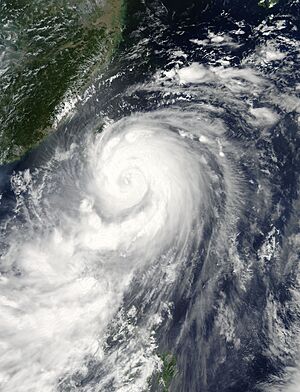Typhoon Matmo (2014) facts for kids
Typhoon Matmo (also known as Typhoon Henry) was a very strong tropical cyclone. It hit Taiwan in July 2014 and then moved on to eastern China. This powerful storm caused a lot of damage and affected many people.
Typhoon Matmo caused about $567 million in damage. Sadly, 62 people lost their lives because of the typhoon.
Contents
What is a Typhoon?
A typhoon is a type of tropical cyclone that forms over the western Pacific Ocean. It's like a giant spinning storm with very strong winds and heavy rain. These storms get their energy from warm ocean waters.
How Do Typhoons Form?
Typhoons start when warm, moist air over the ocean rises. As this air rises, it cools and forms clouds. More air rushes in to replace the rising air, creating a cycle. The Earth's rotation makes the storm spin, forming the familiar spiral shape. When these storms get strong enough, they are called tropical depressions, then tropical storms, and finally, typhoons.
Typhoon Matmo's Path
Typhoon Matmo began as a tropical depression on July 18, 2014, in the Pacific Ocean. It quickly grew stronger as it moved west. By July 20, it became a typhoon.
Hitting Taiwan
Matmo made landfall, meaning it hit the land, in Taiwan on July 22. It brought very heavy rain and strong winds, causing floods and landslides. Many flights were canceled, and schools and businesses closed to keep people safe.
Moving to China
After Taiwan, Matmo moved across the Taiwan Strait and hit eastern China on July 23. It continued to bring heavy rainfall and strong winds to cities like Fuzhou. The storm weakened as it moved inland, eventually breaking apart.
Impact and Damage
Typhoon Matmo caused significant problems in both Taiwan and China.
Damage in Taiwan
In Taiwan, the typhoon caused widespread power outages, leaving many homes without electricity. Heavy rains led to severe flooding, especially in low-lying areas. Some roads were blocked by landslides, making it hard for people to travel. Farmers also suffered losses as their crops were damaged by the strong winds and rain.
Damage in China
When Matmo reached China, it continued to cause flooding. Cities experienced streets turning into rivers, and some buildings were damaged. Emergency teams worked hard to help people affected by the storm and clear debris. The total cost of the damage was very high, showing how destructive typhoons can be.
Staying Safe During a Typhoon
When a typhoon is expected, it's important to stay safe. Governments issue warnings, and people are often advised to stay indoors, secure loose objects, and prepare emergency supplies. Understanding these powerful storms helps communities prepare and protect themselves.
Images for kids
-
Street flooding in Fuzhou following Typhoon Matmo
See also
 In Spanish: Tifón Matmo (2014) para niños
In Spanish: Tifón Matmo (2014) para niños
 | Delilah Pierce |
 | Gordon Parks |
 | Augusta Savage |
 | Charles Ethan Porter |



